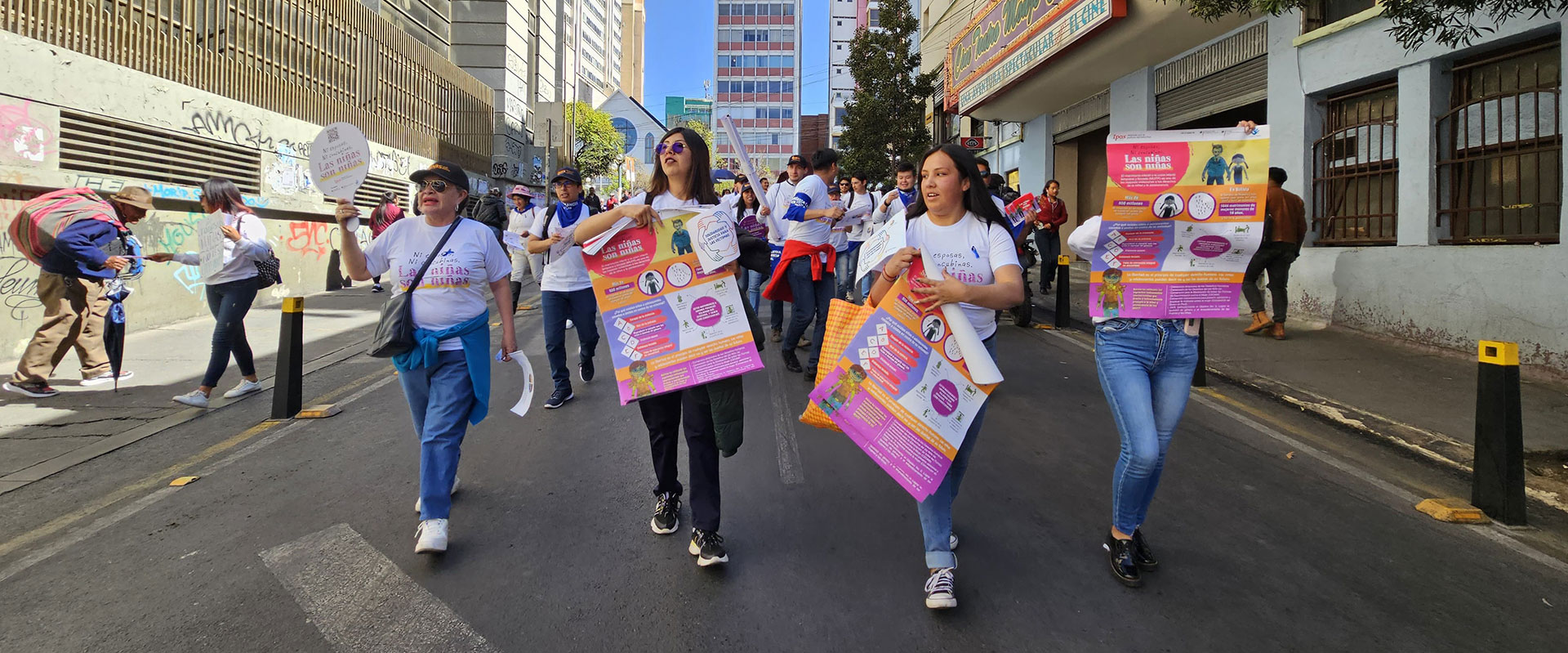For over 25 years, Ipas Bolivia has been a trailblazer in advancing the rights of survivors of sexual and gender-based violence (SGBV)—raising awareness and pushing for proactive solutions. Unlike many initiatives focused mainly on responding to violence, Ipas Bolivia goes further by not only ensuring care and justice for survivors but creating comprehensive programs to prevent violence before it happens.
“Preventing sexual violence is just as important as addressing it. That’s why at Ipas Bolivia, we work not only in health care but also in education, community support, and public policies that tackle the problem at its roots and drive real and sustainable change,” says Malena Morales, director of Ipas Bolivia.
Tackling the issue on multiple fronts, Ipas Bolivia is creating a safer future for Bolivian youth and redefining standards for SGBV prevention. Here are six powerful ways they’re driving change.
1. Taking a stand against child, early and forced marriage and union
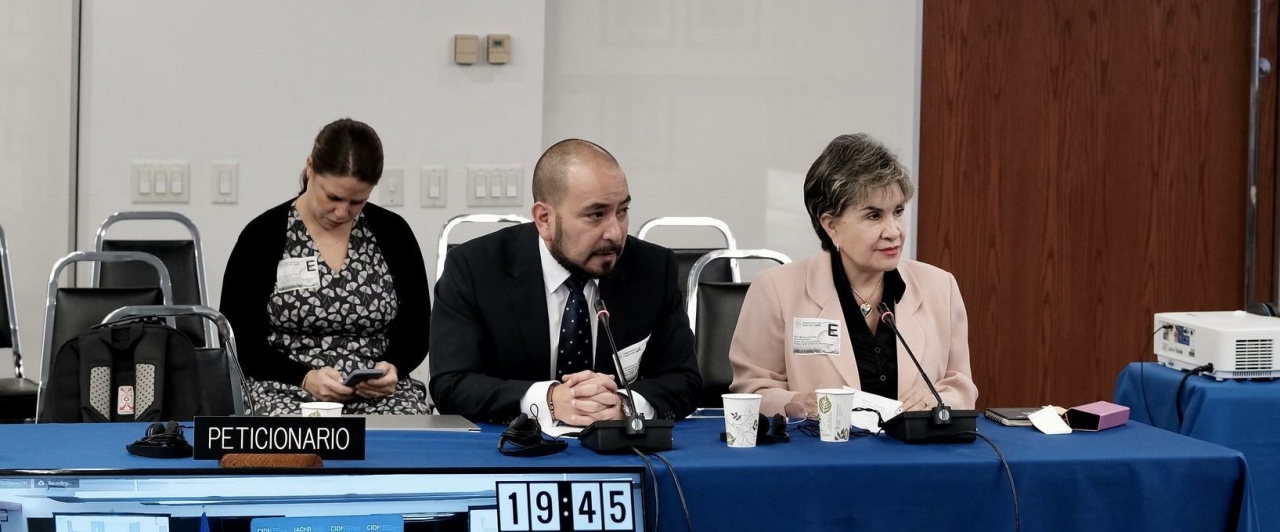
Ipas Bolivia Director Dr. Malena Morales and Policy Coordinator Martín Vidaurre (pictured above, sitting at table) presented testimony at the hearing.
Giving testimony at a recent Inter-American Commission on Human Rights (IACHR) hearing, Ipas Bolivia presented evidence showing how child, early and forced marriages and unions perpetuate a cycle of sexual and gender-based violence. Highlighting gaps in Bolivian laws like the Family Code that allow these harmful practices, Ipas Bolivia showed how they damage the health and futures of young girls. As a result, Bolivia’s Vice Minister of Equal Opportunities Dr. Nadia Cruz Tarifa reaffirmed Bolivia’s commitment to ending forced and early child marriages and unions.
2. Designing digital tools to prevent violence and support survivors
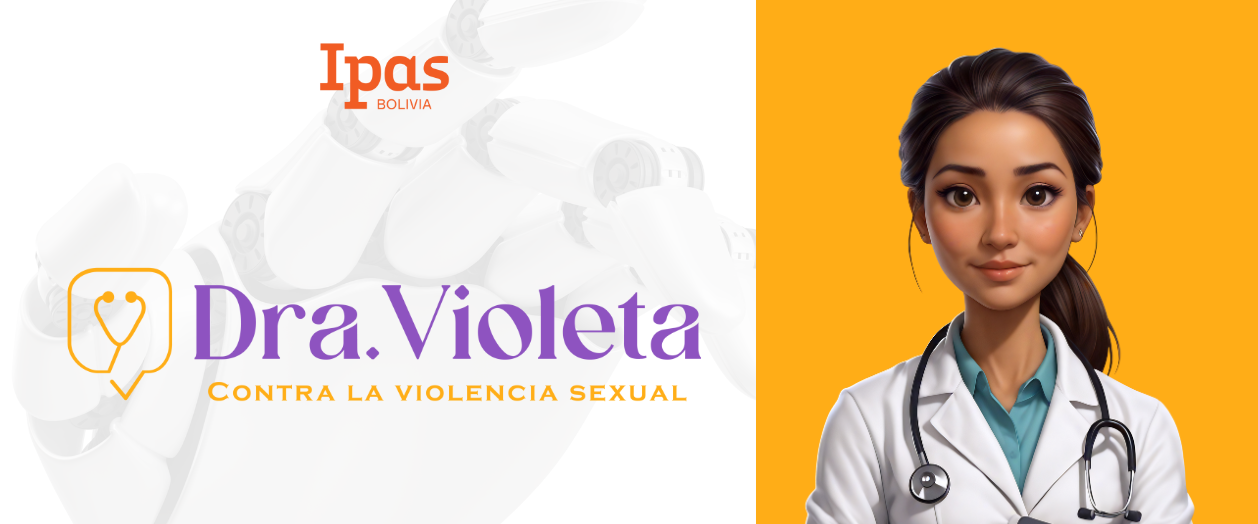
Ipas Bolivia has developed two free and easily accessible digital tools to combat gender-based violence, support survivors, and strengthen health-care providers in their response efforts. The Comprehensive Care Model for Victims of Sexual Violence (MAIVVS) and Comprehensive Safe Care Manual (MIAS) apps, specifically designed for health-care professionals, provide essential resources to improve care and response to cases of sexual violence. To date, MAIVVS has recorded 2,629 downloads and MIAS 2,176, reaching a total of 4,405 downloads.
Complementing these efforts, Dra. Violeta—the first Spanish-language chatbot of its kind—offers survivors of sexual violence rapid and confidential AI-based support, ensuring timely assistance when it’s needed most.
3. Partnering with schools to empower future generations
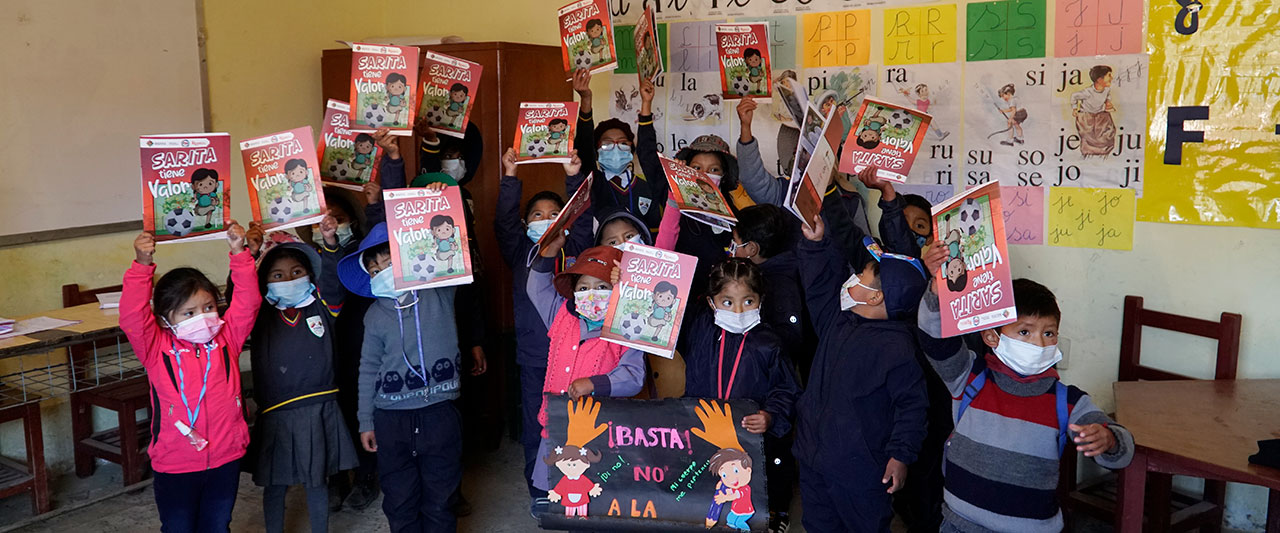
Pictured above: A class photo of students posing with their educational comic titled “Sarita has value” (Sarita tiene valor).
In partnership with Bolivia’s Ministry of Education, Ipas Bolivia is integrating SGBV prevention and response education into the school system. This pioneering collaboration not only supports survivors but actively equips young people with the tools to recognize potential dangers and prevent violence before it starts. Ipas Bolivia’s materials show kids how to “Say no, shout and ask for help” as well as challenge gender stereotypes, prompting boys to ask, “What kind of men do we want to be?”
Sixteen networks to prevent sexual and gender-based violence were established across Bolivia following these Ipas-supported interventions in schools. These networks—made up of parents, principals, and students—strengthen collective commitment and ensure sustainable action to protect future generations.
This effort has helped over 123,745 students, 2,381 teachers, 4,279 parents, and 219 principals to confront restrictive gender norms and build a generation in Bolivia committed to ending sexual and gender-based violence.
4. Challenging gender norms and engaging men as allies
As part of a larger strategy to eliminate violence against women, Ipas Bolivia works to engage and educate men on gender equity and violence prevention. Their work creates dialogue around adopting diverse and inclusive models of masculinity, as the video above clearly shows.
Ipas Bolivia’s Sapiens show hosts conversations with men on healthy masculinities, challenging machismo, responsible parenthood, and sexual and reproductive health and rights. Originally a TV show with 34 one-hour episodes aired in 2020, Sapiens was also broadcast on local radio and is now available on YouTube and as a podcast on Spotify.
On November 15, 2024, Ipas Bolivia and the National Active Masculinities Networks hosted the “More Healthy Men, Less Violence” fair in partnership with Educo and Bolivisión’s “Open Your Eyes” campaign. The event advanced efforts to foster healthier masculinities and break harmful stereotypes.
5. Reaching millions with multi-channel media campaigns
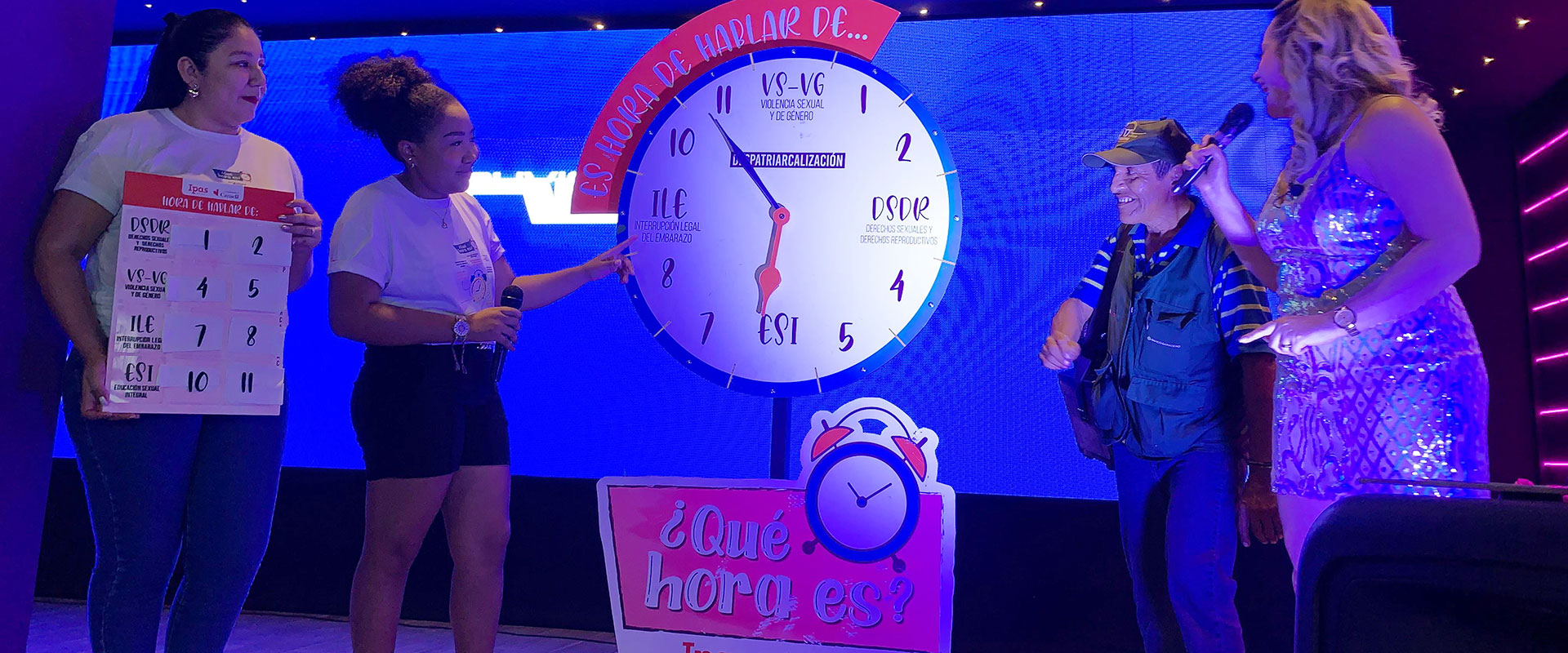
Pictured above: Ipas Bolivia joined Expocruz 2024 with its campaign “What Time Is It?”, engaging the audience in an interactive game that playfully educated on multiple reproductive justice topics, including gender-based violence prevention.
Ipas Bolivia uses creative storytelling that incorporates art, humor and compassion to deliver powerful messaging aimed to educate and inspire action—and their multi-channel approach reaches millions.
For example, through the campaign “Sin Peros en la Lengua,” Ipas Bolivia has reached over two million people, raising awareness of SGBV survivor rights and support resources. The campaign plays on the phrase “Sin pelos en la lengua” (“without mincing words”), urging Bolivians to support SGBV survivors unconditionally in full recognition of their rights, including the right to access abortion.
At Expocruz 2024, Bolivia’s largest international fair, Ipas Bolivia partnered with Bolivisión’s “Open Your Eyes” campaign to promote bodily autonomy and destigmatize reproductive rights through its interactive initiative, “What Time Is It?”. This engaging campaign educated participants through an interactive game on sexual education, gender-based violence prevention, legal abortion and dismantling patriarchy.
6. Building powerful coalitions and creating pathways to justice for survivors
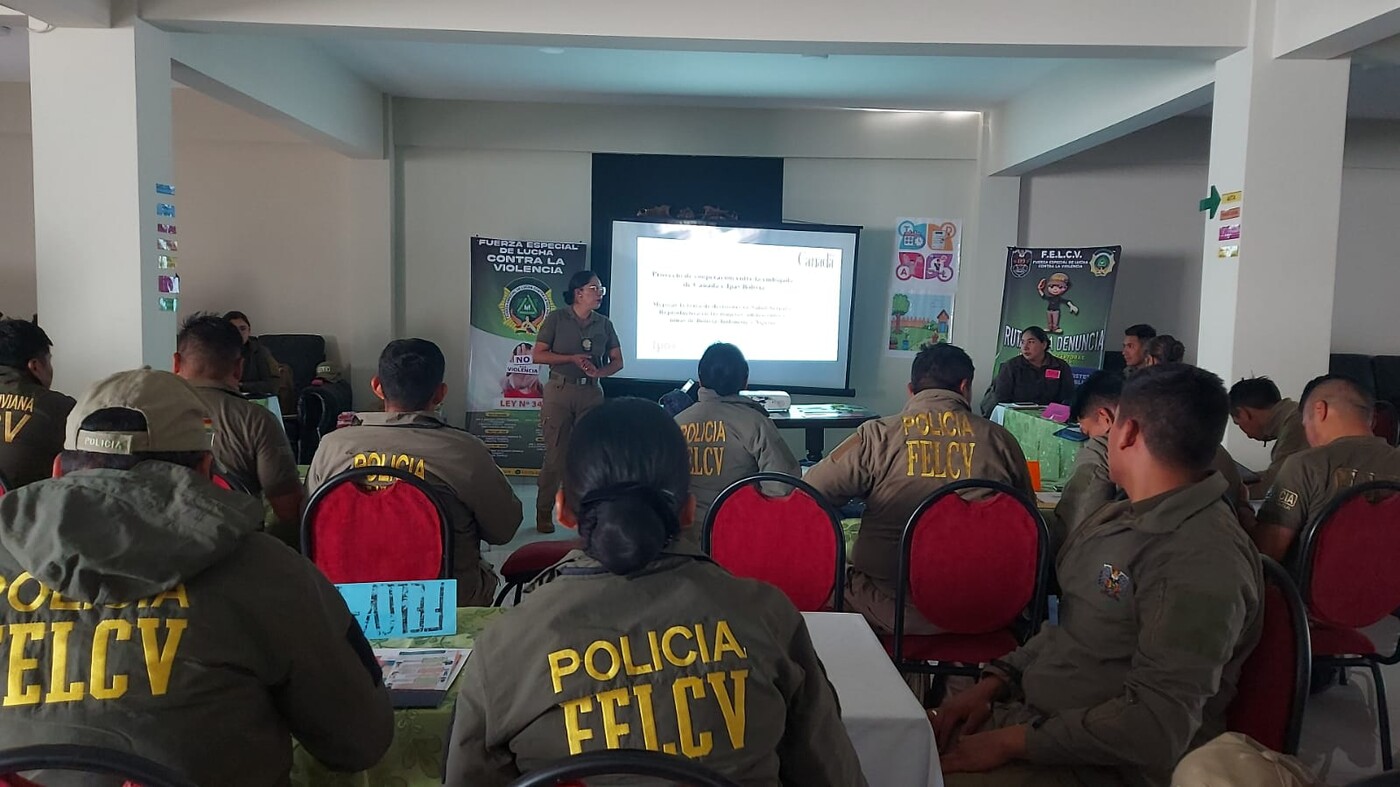
Pictured above: Police officers in Boliva attend Ipas-supported training on how to offer comprehensive, restorative care without re-victimizing the survivors of sexual violence.
Ipas Bolivia united advocates and civil society organizations to form the Pact to Decriminalize Abortion, which helped secure a landmark Supreme Court ruling that expanded abortion access for SGBV survivors. Since then, Ipas Bolivia has partnered with the Bolivian government to train civil servants on comprehensive care for survivors, including their right to abortion.
Thanks to strong community partnerships, Ipas Bolivia’s network has grown to 172 partners, who have worked together in various ways to ensure almost 20,000 women—including many survivors of sexual violence—could access compassionate, high-quality abortion care since 2023. Strategic alliances with the Vice Ministry of Health and inter-institutional networks have also advanced regulations to improve access to quality health services. Networks of lawyers, health providers, and community agents further expand coverage and care.
Over the past decade, Ipas Bolivia has also trained nearly 18,000 police officers and recruits on SGBV, reproductive justice, and gender norms. The impact is clear—in 2023 in the city of El Alto, Ipas-trained police officers ensured a sexual assault survivor received life-saving reproductive health care by quickly transporting her to the hospital and advocating on her behalf.


